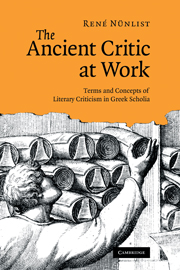Epilogue
Published online by Cambridge University Press: 29 August 2009
Summary
This final part is deliberately not called ‘conclusion’. All the preceding nineteen chapters are capped by a brief conclusion. Little could be gained from repeating or even summarising them here. More importantly, it is in the nature of conclusions to generalise. It is, however, doubtful whether a heterogeneous corpus such as the poetic scholia is conducive to such generalisations. The material has gone through too many different hands that often cannot be identified – at least not now. At the same time too much seems to depend on the sheer randomness and hazards of textual transmission. The latter point should also caution against drawing conclusions from statistical data (‘notes on X are three times more frequent than notes on Y’) or from argumenta ex silentio. It would be difficult to argue that scholars were not interested in a particular device just because it is never discussed in the extant scholia (or in one of the relevant treatises) – leaving aside the question whether ‘never’ could be said with sufficient confidence about a corpus that is vast, heterogeneous and to some extent insufficiently edited. This, of course, is not to say that one should not draw conclusions from the material presented here at all. The reader will find them at the end of each chapter with respect to that particular topic. It is, however, less clear to me whether one could (or even should) draw general conclusions about literary criticism in the corpus of poetic scholia as a whole.
- Type
- Chapter
- Information
- The Ancient Critic at WorkTerms and Concepts of Literary Criticism in Greek Scholia, pp. 366 - 367Publisher: Cambridge University PressPrint publication year: 2009



